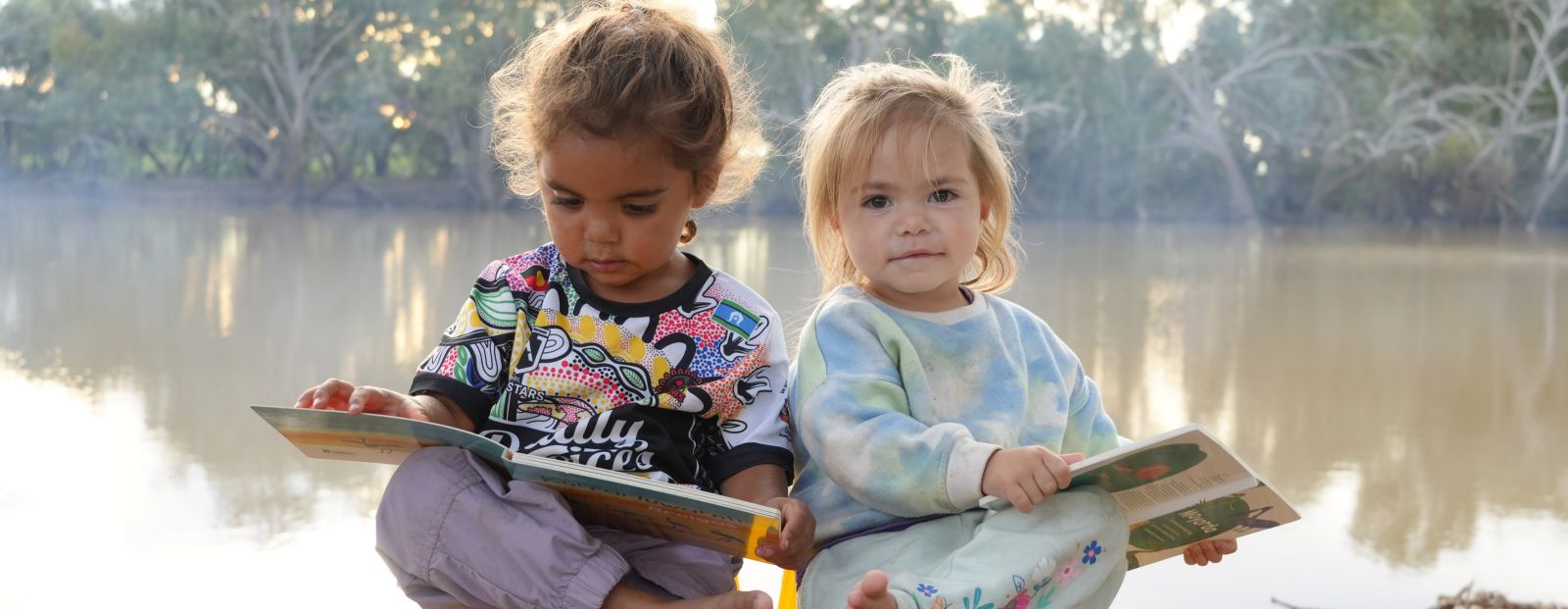
Along with the Indigenous Literacy Foundation’s Key Messages document, we encourage people to follow this Communications Guide to ensure you speak appropriately about Aboriginal and Torres Strait Islander peoples and Communities.
What words are always capitalised?
Aboriginal and Torres Strait Islander peoples
First Nations
Indigenous
Elder/Elders
Traditional Owners
Country/Countries
Community/Communities ‑ We capitalise First Nations Communities because a Community is not only a group of people, but also an identity. Therefore it is a proper noun. We encourage you to capitalise it too. However, not everyone does this.
People or peoples?
We use “peoples” when describing First Nations peoples because it describes different groups of people. There are hundreds of First Nations Communities, and we are not one group of people.
“Closing the Gap”
As an organisation, we have moved away from deficit discourse and statements such as “Closing the Gap” or talk about “closing the literacy gap”. This is a government initiative, and we do not align with this. The ILF believes in sharing the strengths, achievements, and incredibly positive work being done in remote Communities by Aboriginal and Torres Strait Islander peoples. For more information on this, please see this article: ‘Once students knew their identity, they excelled’: how to talk about excellence in Indigenous education. You can also read this story from ILF CEO Ben Bowen about the importance of sharing excellence: Impact in Indigenous literature continues to grow.
How to do an Acknowledgement of Country
Curious about how you can make your Acknowledgment of Country meaningful? While it is great to have the Traditional Owners acknowledged in workplaces, it may not always be done in an appropriate way. It is always good to make it personal and not performative, and there is no need to be nervous about it. Understanding what Country means to First Nations peoples, and showing respect to them by acknowledging it, does not need to make you nervous. Check out this great guide by NITV to improve your Acknowledgement of Country: How to Acknowledge Country in a meaningful way.
Words and phrases to avoid
Lower case “indigenous” ‑ This is often used but is considered offensive because “Indigenous” is a proper noun, just like “Australia”, describing a group of people.
“Aborigines” ‑ This is outdated and considered offensive. Some older Aboriginal people may refer to themselves as “Aborigine”, for which they should not be corrected. But non‑Indigenous people should not use this word.
“Indigenous and Torres Strait Islander” ‑ Indigenous includes both Aboriginal (mainland Australia) and Torres Strait Islanders.
“Our” First Nations people ‑ You should avoid using “Our” because it is possessive, and implies ownership of First Nations peoples.
“ATSI” ‑ It is considered offensive by some to abbreviate Aboriginal and Torres Strait Islander, and this should be avoided.
Please be mindful that these suggestions are location specific. These are general ideas, but the most important thing is to build relationships with the First Nations people in the Communities in which you live and work. Understanding how these people wish to be titled and acknowledged is the most respectful and important first step.
Be open to change. Titles may change, and you may have to adapt what you call First Nations Communities in order to be respectful. Be open to this and always try to understand why.
First Nations words and language
First Nations people have certain words and phrases that you may not know. These are not offensive, but should be used only with the permission of the person you are with. It is considered rude to assume that First Nations people are happy for you to use these words around them, however it is always ok to ask.
Mob ‑ Someone’s “mob” is their cultural Community, family, etc. For example, your mob may be Wiradjuri, Bundjalung, Noongar, etc. It can also be used more colloquially as in “what are you mob up to?” referring to a group of people.
Deadly ‑ If someone calls you “deadly”, you’re lucky! This means excellent, amazing, really good.
Yarn ‑ While “yarning” is used widely now, it has a significant meaning to First Nations peoples and has been practised for thousands of years. Yarning is an integral part of Indigenous ways of learning and sharing. It is usually undertaken by Aboriginal people coming together informally to unwind or in more formal ways such as discussing Community or cultural matters. Storytelling is an important part of yarning that allows for reflection on recent or past histories and lived experiences and sharing knowledge.
Gammin ‑ This means joking, fake, or pretend. For example, if you are messing with someone you might say “I’m just gammin!”.
Shame ‑ If someone says “that’s shame” they may not be referring to being ashamed, but being embarrassed.
Tidda and Sis ‑ Tidda and sis are ways that Aboriginal and Torres Strait Islander people refer to female friends and family.
Brother and Bro ‑ Brother and bro are ways that Aboriginal and Torres Strait Islander people refer to male friends and family.
Aunty and Uncle ‑ A term used to describe Aboriginal and Torres Strait Islander peoples. You should never assume someone wants you to call them Aunty or Uncle, and wait for them to introduce themselves as this before using it.
All of these titles are location specific, and appropriate or inappropriate depending on where you are. Always check with the Community about what is the respectful way to refer to someone.
Names of major groups
Murri (Qld, northwest NSW)
Noongar (WA)
Koori (NSW)
Goori (north coast NSW)
Koorie (Vic)
Yolngu (Arnhem Land)
Anangu (Central Australia)
Palawa (Tasmania)
Nunga (not always an appropriate term)(SA)
Ngarrindjeri (SA: River Murray, Lakes, Coorong people)
Torres Strait Island Peoples
Murray Island Peoples
Mer Island Peoples
Remember: The best thing you can do is ask. It is ok to ask a First Nations person how they would like to be referred to ‑ and it should never be assumed.